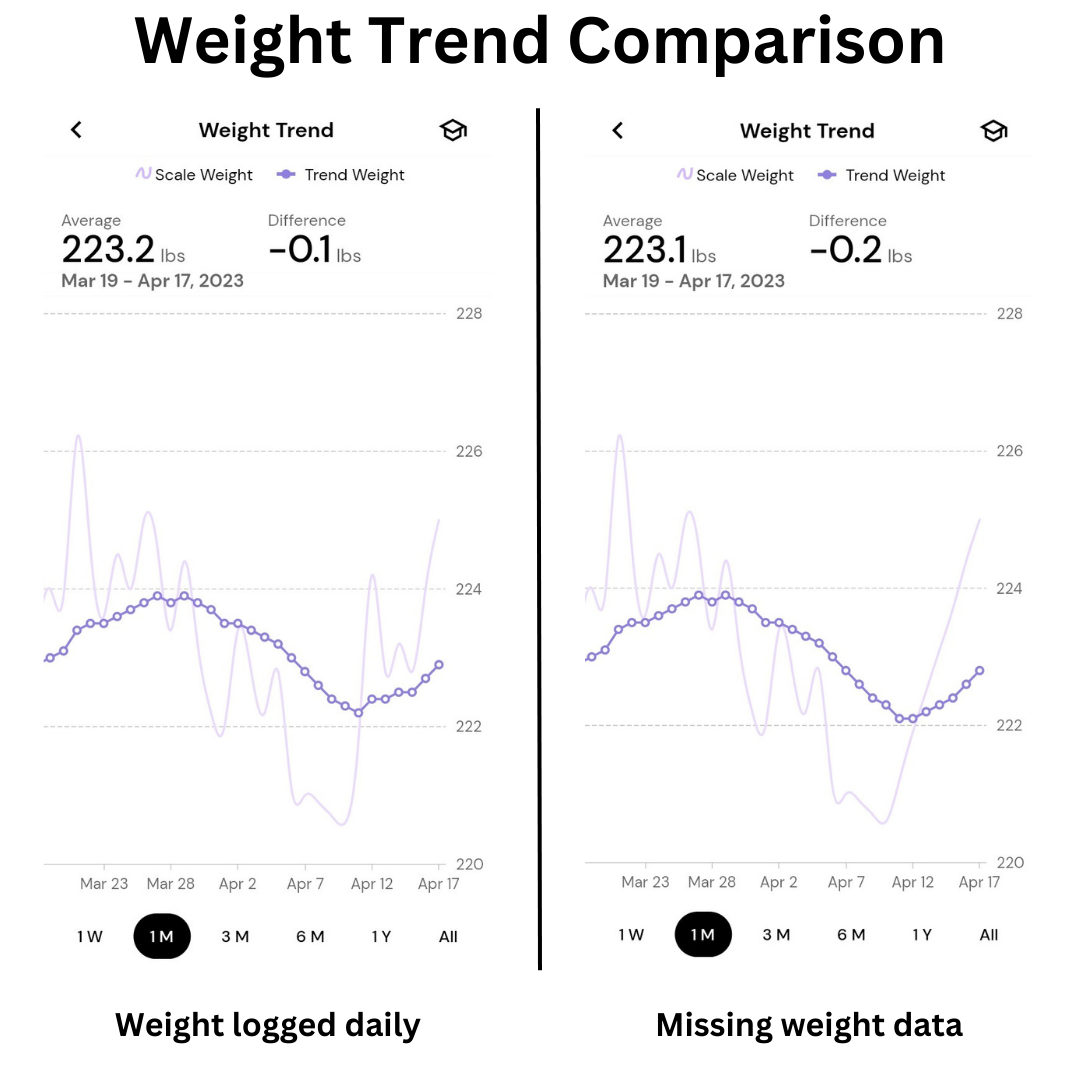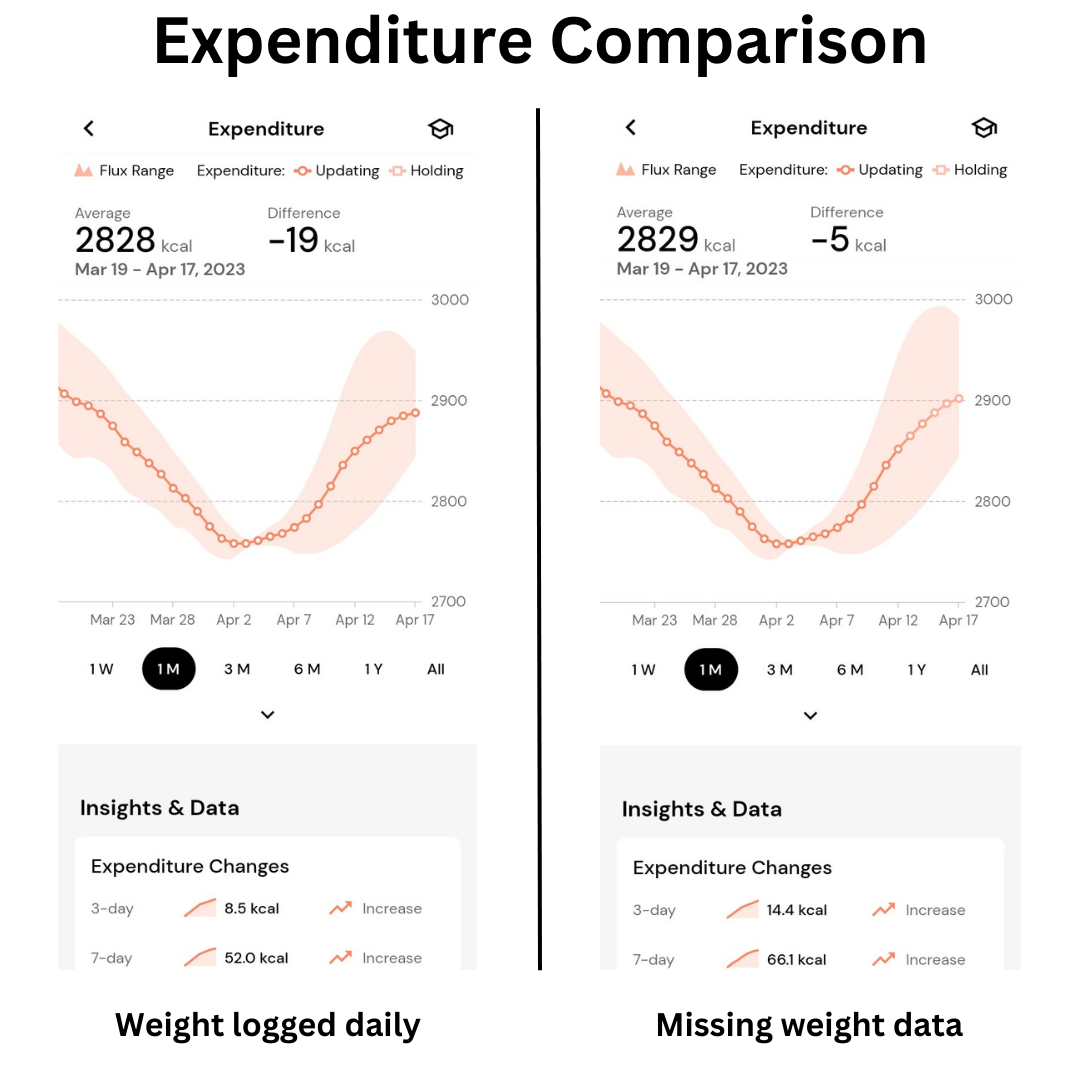Short answer: once per week is the minimum, but daily is preferable
Longer answer: MacroFactor’s algorithms calculate your expenditure based on your weight trend and logged nutrition intake. Coaching updates are downstream of expenditure changes.
In essence, MacroFactor needs to know the way in which your energy intake is influencing your weight. If you keep logging your food, but you don’t log your weight, MacroFactor knows how much you’re eating, but it doesn’t know how your energy intake is influencing your weight. So, your expenditure calculation will pause (its status will change from “updating” to “holding”) until you log your weight again.
Once you log your weight again, the expenditure algorithm will be able to catch back up immediately (assuming you’ve still been logging your nutrition frequently enough). It doesn’t matter if you skipped weighing in for one day, or for an entire month – it just takes one missing weight entry to momentarily pause updates, but it only takes one new weight entry for your expenditure calculation to start updating again.
You don’t need to log your weight as frequently as you need to log your nutrition because it’s not too hard to generate reasonable guesses for missing weight data. If you weighed 170 pounds a week ago, and 169 pounds today, your weight probably didn’t decrease by exactly 1/7th of a pound per day, but assuming it decreased by exactly 1/7th of a pound per day will generate a weight trend that’s close enough to reality for the expenditure algorithm to make accurate updates.
Just to illustrate, I’m writing this on April 17th, and I’ve logged my weight every day for the past week. If I deleted all of the weight entries between April 10th and 17th (i.e. if I deleted weight entries for the 11th through the 16th), those deletions would only have a trivial impact on my weight trend and expenditure over the past week. Upon accepting my weekly program update, my energy intake targets for the current week would have differed by fewer than 15 calories per day.


There are edge cases where this could create problems. For instance, let’s assume you logged all of your food for two months, but didn’t log your weight for two months. During the first month, you consumed considerably more than normal, and therefore gained a pound per week. During the second month, you consumed considerably less than normal, and therefore lost a pound per week. When you finally logged your weight again at the end of this two-month process, your weight trend would suggest that you’d been weight-stable the whole time. So, the expenditure algorithm would (falsely) assume that your energy expenditure was much higher during the first month (it would think you were maintaining weight on a higher energy intake, instead of gaining weight), and much lower during the second month (it would think that you were maintaining weight on a lower energy intake, instead of losing weight). However, since logging your weight takes much less time and effort than logging your nutrition, this is an exceedingly uncommon scenario.
Notably, the scenario described above couldn’t play out over the course of a single week, because MacroFactor’s algorithms consider about three weeks of data when calculating your expenditure. If you ate more and gained a bit of weight early in the week, and then ate less and lost a bit of weight late in the week, your calculated expenditure at the end of the week wouldn’t be meaningfully different if you a) logged your weight every day, or b) you only logged your weight at the start and end of the week.
So, in practical terms, we generally recommend logging your weight every day. However, if you’d prefer to just log your weight once per week, that’s totally fine – your calculated expenditure will still be accurate, and you’ll still be able to get timely, appropriate weekly program updates.
One of the Coaching Modules that you might encounter during your weekly Check-In is the weigh-in module. During this coaching module, if enabled, you will be notified of your last weigh-in if you do not have a weight entry for the current day. The module will then ask if you’d like to log your weight, so that the algorithm can have the most up-to-date information before triggering your Check-In. You can decline, but it’s important to note that weighing in at least once a week is recommended.
You may also enjoy the companion article about how often you need to log your nutrition for consistent expenditure and program updates.
Now that you understand how frequently you should log weight for ideal program updates, you might enjoy one of these articles next:
Edit or Delete Past Weight Entries